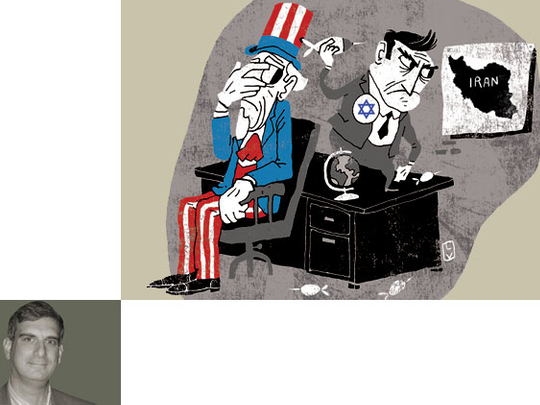
As international negotiators gathered in Istanbul over the weekend for talks on Iran's nuclear programme the diplomatic drama begged a very basic question: what do the Americans want?
To be very blunt and undiplomatic about it: is Washington involved in these talks because the Obama administration hopes to avoid military action in Iran? Or because it needs diplomatic cover for an attack that is more or less inevitable?
A sense of high drama surrounded the meeting. It has been 15 months since Iranian officials last sat across the table from representatives of the inelegantly named "P5+1", meaning the five permanent members of the United Nations Security Council, plus Germany. Also in attendance was the European Union's foreign affairs chief, Catherine Ashton, whose spokesman told reporters the session took place in a "positive atmosphere," indicating that "there is a desire for substantive progress."
The fact that the two sides agreed to meet again next month is, indeed, a good sign. So is the announced location for the next round of talks: Baghdad. Prior to the Istanbul session Iran said it wanted the next round, if it happened at all, to be held in what Tehran regards as a more neutral venue.
This seemingly small concession on the P5+1's part has significant symbolic value. It was not so long ago, under George W. Bush's administration, that Washington essentially took the position that no talks could begin until Tehran conceded everything in advance. So agreeing to a venue change may not be a big deal in and of itself, but it speaks to a desire to make things work - or at least to keep them moving. Not much, but it's something.
For Barack Obama, with just over six months to go before a presidential election, Iran now looks like the worst sort of foreign policy problem.
It is an issue whose emotional ‘hot buttons' (Iran, nuclear weapons, a threat to Israel) are calculated to touch the nerves of many voters who otherwise lack interest in foreign affairs. Worse, it is an issue with a seemingly simple solution (military action) that is widely embraced by voters and politicians of both parties, but widely rejected by people with real knowledge of the Middle East's complexities.
Mixed messages
So Obama, having declared an Iranian nuclear capability unacceptable, is hemmed in on one side by politicians of all stripes urging him to get on with attacking the place, and on the other by both his own innate caution and a foreign policy establishment (led by the US military) that sees bombing Iran as, at best, a temporary fix likely to make things worse in the long run. It has become commonplace, especially on the American left, to see in all this a replay of the Bush administration's march toward war with Iraq in the autumn and winter of 2002-03.
That comparison is not, however, as valid as it might seem.It was hard to watch the Bush administration nine years ago and not conclude that it was itching for a war in Iraq and merely going through the motions of seeking peace. The administration's efforts at the United Nations in late 2002 were visibly grudging and accompanied by a huge military build-up in Kuwait. It was obvious that the Americans were getting set to invade.
In private, as we now know from sources both British (the Downing Street Memo) and American (Richard Haass, then the Director of Policy Planning at the State Department, writing in his 2009 book War of Necessity, War of Choice) that the decision to invade Iraq was, to all intents and purposes, made long before the rest of us even began paying attention.
In contrast, while it is clearly possible to accuse Washington's current crop of politicians and foreign policy wonks of sending mixed messages, it is also pretty clear that the Obama administration is trying to avoid attacking Iran.
Which is not to say that an attack might not come anyway. A misunderstanding in the Gulf or elsewhere might escalate into shooting. The war party might win out in Washington, especially if Iran were to make some overt move toward building a nuclear weapon. Perhaps most worrisome, Israel might attack on its own, pulling the United States into the conflict whether it wants to be there or not.
It is indicative of the low expectations surrounding the Istanbul talks that an agreement simply to meet again counts as a success. What remains to be seen is whether talks alone will be enough to keep the US-Iran non-relationship from heading toward war, despite the best efforts of some of the Obama administration's critics in Congress, the Republican party and the media. 2012 is not a re-run of 2002. Not yet, at least.
Gordon Robison, a longtime Middle East journalist and US political analyst, teaches political science at the University of Vermont.










